|
2020 USA Olympic Team Trials Marathon - The Men's Race
by Star Blackford
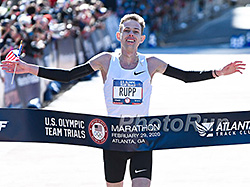
photo: Victah Sailer/PhotoRun
Galen Rupp Breaks the Tape
|
The 2020 U.S. Men's Olympic Trials Marathon was a race for the record books: Galen Rupp, with his 2:09:20 win, became only the second man to repeat as Trials winner (following Frank Shorter's tradition of wins in 1972[tied w/ Kenny Moore] and 1976); that same time was the third fastest winning and overall time at an Olympic Trials Marathon - and it was run on a tough course. The three men making the team: Galen Rupp, second-place finisher Jacob Riley – who ran a PR 2:10:02; and third-place Abdi Abdirahman (2:10:03), ran negative splits on the decidedly hilly and windy course. And Abdirahman, who made his fifth Olympic team, obliterated his own U.S. Masters record set at the 2019 New York City Marathon, running almost ninety seconds faster than he did in November. Abdirahman, aged 43, also became the oldest U.S. Olympic Marathon team qualifier; the record was previously held by Meb Keflezighi, who was 40 when he made the 2016 team.
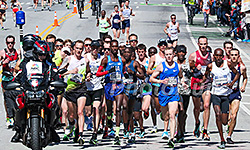
photo: Victah Sailer/PhotoRun
The Early Lead Pack
|
The Strategy
In a race where the hills were bad but the wind was worse (15 mph with 26 mph gusts), the newly installed Olympic team told us that their primary strategy was to run conservatively as long as possible. On what they expected to be a 2:10 to 2:11 day where the second half "would count," Rupp had been advised to conserve as much as possible at the start and save any big moves until mile 19 or 20; Riley's coach had him prepared to hold back in anticipation of a fast second half; and Abdirahman, who had not previously seen the course, was counting on his strength as a hill runner to carry him to the second or third berth, knowing that beating Rupp at the marathon distance, in his words, "wasn't realistic." That the race played out just as each of them had visualized was gratifying, they said, but not without its challenges – particularly the early moves by Luke Puskedra and Brian Shrader.
The Early Leaders – Who Were They?
Luke Puskedra, whose qualifying time of 2:17:53 in the 2019 Chicago Marathon suggested that he could not make the team, but whose earlier marathon success suggested he could try - led the race through mile 3 in a move that was interesting but ultimately did not lead to anything. Brian Shrader stepped up to take a more definitive lead at mile 5 and continued to build his lead which, at its height, had opened up to a 50 second lead on the chase pack. As his lead continued past the 10K, 10 mile and then Half Marathon point, one began to wonder, based on his very legitimate 1:01:07 Half Marathon PR, if he might be the breakout runner of the 2020 Trials who ran away and ultimately could not be caught – or, alternatively, if he was the guy who would get good TV time only to crumble. The latter turned out to be the case, and not without notice from the men who would make the team: they found it frustrating, they said, knowing that gaps that were opened would eventually have to be covered, but trusting that it wasn't time yet. Ultimately, Shrader's lead was shaved down over the course of miles 15 and 16, with Rupp taking over the lead and Augustus Maiyo, Leonard Korir, Abdi Abdirahman and local runner Matt McDonald joining him. Shrader would drop out at mile 18, the end of the second loop.
Miles 16 – 23: Galen Leads; Korir, Abdirahman and Maiyo Cover
With Shrader out, Rupp in the lead and a new pack of frontrunners established, Rupp chatted briefly with Maiyo before slowly increasing his lead, with Maiyo, Korir and Abdirahman settling into the 2nd, 3rd and 4th positions. Soon after, Abdirahman outpaced the two Army Runners, Maiyo and Korir, leaving these two to fight for the third-place berth. By mile 21, we reported in our live coverage that Abdi Abdirahman had moved into third place, and "if nothing strange happens, we can confidently say the top three finishers will be: Galen Rupp, Augustus Maiyo and Abdi Abdirahman. But, this is a marathon, so strange things can happen."
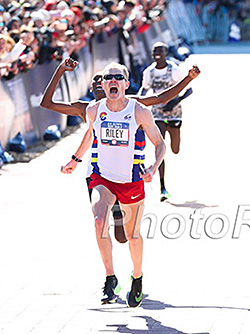
photo: Victah Sailer/PhotoRun
Jacob Riley Finishing in 2nd Place
|
Mile 24 On: Rupp Wins (No Surprise) and Strange Things Happen (Surprise!)
Strange things, in fact, were on the way. Jacob Riley, who had spent the middle seven miles of the race running a controlled and methodical race, began bearing down on the lead group, pulling into fifth position with two and a half miles to go and looking stronger than most of the remaining men. By mile 24, Rupp had amassed a commanding 55 second lead, leaving three men - Korir, Abdirahman and Riley – to vie for the two remaining spots. At mile 25, Rupp's victory assured, the race for the final two spots continued. Ultimately, Riley ran to a PR 2:10:02 finish for second place – no small feat given the course conditions - and 43-year old Abdi Abdirahman obliterated his masters record while punching his ticket to his fifth career Olympic games with his 2:10:03 finish. Korir followed in fourth place, just three surely devastating seconds later (2:10:06).
The Pre-Race Favorites
Pre-race favorites Jared Ward, Scott Fauble and Bernard Lagat finished with varied levels of success: Ward, considered a favorite for the team pre-race, finished in 27th place in 2:15:55; Fauble in 2:12:39 for 12th place. Lagat, who had been considered more an outside shot but still a contender, finished in 2:14:23 for 18th place.
The Achilles Heel
Rupp and Riley, the top two finishers, shared a sarcastic laugh at the post-race press conference when asked if they might consider incorporating more and longer periods of recovery into their racing considering their successful performances?
"By recovery, you mean the three years I spent rehabbing my foot?" Riley replied. "No, I don't recommend that at all."
It may not be a recommended strategy, but it's certainly worth noting that Rupp won his second U.S. Olympic Trials Marathon in dramatic fashion after a year overshadowed by recovery from surgery - Rupp had a frayed Achilles tendon and Haglund's deformity repaired following the 2018 Chicago Marathon, which he ran 2:06:21 - as well as the disbanding of his training group (the Nike Oregon Project), a late drop from the 2019 Chicago Marathon due to a calf strain and a major coaching change. Riley, who disappeared from the sport after his 15th place finish at the 2016 Trials, underwent the same surgery as Rupp in 2018 and wasn't sure he'd get to race as an elite again; he didn't run another marathon until taking top American honors (9th overall) at the 2019 Chicago Marathon. While Rupp, who could challenge for a win in most any major event, may have been expected to make the team, Riley's comeback story – and Rupp's overcoming the mountain of odds recently stacked against him – remind every runner of the power of perseverance.
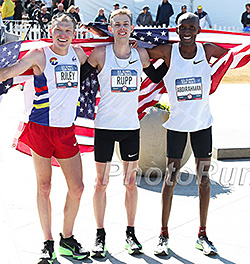
photo: Victah Sailer/PhotoRun
The Three Who Will be the Olympic Marathon Team
|
The Team is Determined, and the Future is Still Bright
As we close this piece out, we would be remiss not to mention the growing depth of U.S. men's distance running. While the winning time of 2:09:20 was slightly slower than the 2:09:02 and 2:09:08 it took to win the previous two Trials, the 2:09:20 in 2020 was run on amuch harder course. It should also be noted that top ten finisher were faster than the ten Americans have ever run at any Marathon ever; including the fast 2012 Houston Trials were tenth place was 2:12:29 on the faster course.
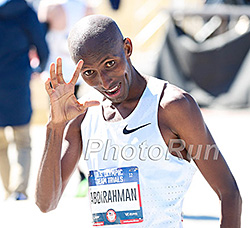
photo: Victah Sailer/PhotoRun
Abdi Abdirahman Signals: Five! (His fifth Olympic Team)
|
Top Finishers & Prize Money:
1. Galen Rupp - 2:09:20 - $80,000
2. Jacob Riley - 2:10:02 - $65,000
3. Abdi Abdirahman - 2:10:03 - $55,000
4. Leonard Korir - 2:10:06 - $20,000
5. Augustus Maiyo - 2:10:47 - $10,000
6. Martin Hehir - 2:11:29 - $6,000
7. Clayton Albertson - 2:11:49 - $3,000
8. Jonas Hampton - 2:12:10 - $1,000
9. Colin Bennie - 2:12:14 - $0
10. Matt McDonald - 2:12:19 - $0
|









